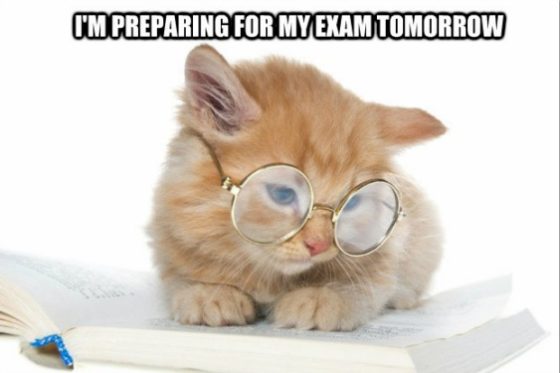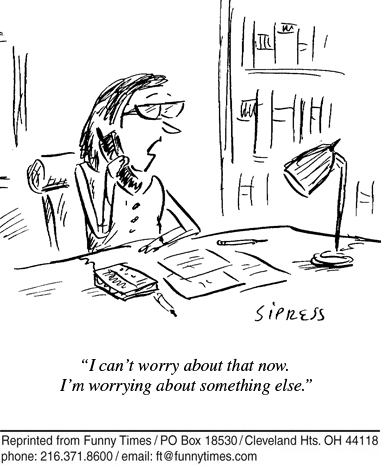
It happens a lot, that dreaded “study-a-day-before-the-test” deal that causes lots of stress and results in multiple brews of coffee.
There might be highlighting.
There will definitely be crying.
Office hours might be a thing and there will probably be some frantic texts and emails sent to both professors and friends, swearing that this will “never happen again” and “when did we even learn this?”
You might look like this:

Even so, you study on and you pray that everything will be okay. You stay up all night studying, maybe getting a few hours of sleep if you’re lucky. You promise yourself that next time, you’ll do better.
If this is something you have experienced, then the information provided in a recent study* published through the Association for Psychological Science will help immensely.
In the study, the authors attempt to provide tips both from research in cognitive psychology, as well as through their own experience as educators. They provide advice for studying before classes, during, and after, as well as a lot of tips for preparing for tests.
In this part, we will discuss methods of studying and preparing before classes. In part II, we will discuss methods of better learning during and after class and in preparation for exams. Finally, parts I and II will both include memes simply for pure entertainment.
Besides the usual “don’t study at the last minute” that a lot of people know about and yet still happens because, well, life happens, there are also a number of other things that contribute to learning effectively.

Rereading textbooks and notes, generally only focusing on the highlighted words, does not work as well as we think it does. For short-term, those tricks might work, but in the long-term, studies have suggested that these methods consume a lot of time without much real output (e.g., Dunlosky, Rawson, Marsh, Nathan, & Willingham, 2013).
Basically? You might be okay on the midterm, but for long-term memory retention, specifically regarding that cumulative final you’re dreading, this method of studying probably won’t work as well as you might hope.
So what should you do according to Putnam, Sungkhasettee, and Roediger III?
Starting the Semester
Most of this is common sense, but try to minimize the late-nights spent studying by getting organized early in the semester so that you can minimize later stress when weeks like midterms come and assignments never seem to end. Starting good habits when stress levels are low can also help immensely during these dark times of never-ending homework.
Organize
Organization is incredibly important to maintaining both sanity and grades, while still somehow managing to get sleep and having a social life. Therefore, going to the first day of classes and carefully reading over the syllabus is key to juggling this impossible balancing act. By reading the syllabus, you will know what is happening in the class and when assignments are due, so you won’t be blind-sided by multiple projects hitting all at once. Putting your assignments all into a calendar, an excel spreadsheet, or on your phone and making a habit of checking a month ahead every week can help to maintain a good overview of your classes. This can also help you to know when you need to start studying, like when multiple projects are due on the same day.
The authors also recommend setting calendar reminders a week prior to exams, projects, or recurring assignments and quizzes so nothing gets forgotten (Putnam et al., 2016).
Buy the Books
In order to succeed in the class, you need to have the books. Buying textbooks can be incredibly expensive, but be careful of used textbooks, especially if they have highlighting because the previous owner(s) may not have recognized the crucial parts of the text.
Do Not Attempt Multitasking

Multitasking is bad.
It does not work.
Repeatedly switching attention from one task to another can make learning less effective (e.g., Anderson & Fuller, 2010; Craik, Govoni, Naveh-Benjamin, & Anderson, 1996). Any kind of multitasking, in fact, from having a Facebook tab open to listening to music can impair your ability to learn even if you don’t think it bothers you (as qt. Willingham 2010a). Try to make a habit of turning off your media while studying at a quiet place (meaning, unfortunately, Mill Mountain does not count).
Preparing for Class
Sometimes it’s hard to get all of the assigned reading done before class, but by doing so in an effective manner, you will get more out of the class. Don’t try to read as quickly as possible, even if you feel like you’re getting piled down with homework. As the authors point out, comprehension takes time and while reading quickly may get you through the text, you likely won’t be retaining the information you read (Rayner, Schotter, Masson, Potter, & Treiman, 2016). Try to make sure you understand the material before moving on to the next thing; reading is pointless if you don’t remember what you read.
In addition, while highlighting and underlining are popular, studies show that they do not really contribute towards recall later on (Dunlosky et al., 2013). Instead, try these tips:
Answer the Comprehension Questions Prior to Reading
While seemingly counter-intuitive, attempting to answer the questions before reading the chapter can help activate what prior knowledge you do have on the topic and make it easier to connect with the new material. Research also shows that by doing so, you will better be able to remember the material as well (e.g., Pressley, Tanenbaum, McDaniel, & Wood, 1990; Richard et al., 2009).
Ask Yourself Questions While Reading
By actively asking questions about the material you are reading, you will have better comprehension regarding what you read as well as for the future when you make study guides. Potential questions could include defining the topics you are learning about as well as asking yourself “Why is this true?” or “What parts of this page are new to me?” (Putnam et. al., 2016; R. Wong, Lawson, & Keeves, 2002).

“Read, Recite, and Review”
Instead of highlighting or simply reading, read the assigned chapter and then try to recall the major points of the chapter. After that, go back through the chapter and focus on what you missed. This way of studying may take more time, but in the long run, it’s more effective in remembering the material than simply reading or highlighting.
So, what sort of things should you do while in class and what are the best methods of studying for tests (like, say, impending midterms)? Continue on to part II to see what cognitive psychologists and educators recommend doing in order to survive college!
*The study, titled “Optimizing Learning in College: Tips From Cognitive Psychology” was put together by Adam L. Putnam, from the Department of Psychology, Carleton College and, Victor W. Sungkhasettee and Henry L. Roediger III from the Psychological & Brain Sciences Department, Washington University in St. Louis. The link can be found here.
Get connected!
Instagram & Twitter: #PsychRC @RC_Psychology
Facebook: https://www.facebook.com/rcpsychology
Blog: https://psych.pages.roanoke.edu/
Linked In: https://www.linkedin.com/groups/RC-Psychology-8140491/about
Website: http://www.roanoke.edu/inside/a-z_index/psychology